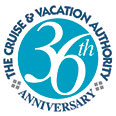Cruising With a Disability
by Shayne Rodriguez Thompson
Cruising has long been a viable and convenient option for disabled travelers. But with cruise lines making an increased effort to accommodate passengers by closely adhering to the guidelines of the Americans With Disabilities Act, cruising has become the vacation of choice for many travelers with mobility issues or sight and hearing impairments. These days, all you need is some careful research and planning, good advice and an open mind, and you can see the world from a cruise ship, regardless of your disability.
Here, we offer you some background on the history of accessible cruising, as well as what cruise lines are doing to better accommodate disabled travelers. Plus, travelers and agents who know what it's like to cruise with a disability have shared their top travel tips, so you can plan a more enjoyable and comfortable vacation at sea.
A Bit of Background on Accessible Cruising
When Access Now, a Miami Beach-based organization that promotes rights for disabled travelers, settled a lawsuit with Carnival Cruise Lines over discrimination issues in 2001, it marked a major step toward making cruising a better option for folks with health issues. The lawsuit, which had called for the addition of more cabins with wider doorways and less cramped interiors, along with more shower-accessible bathrooms, was a success, resulting in Carnival's agreement to abide by certain minimum requirements. These include substantial improvements, such as designing up to 25 disability-equipped staterooms per ship (many have between two and ten).
But this was just one step in an ongoing effort by Access Now, which subsequently pursued claims against Norwegian Cruise Line, Holland America Line, Westtours and Costa.
Similarly, in 2010 a suit was filed by five hearing impaired and four wheelchair-bound NCL passengers who took Hawaii cruises. The cruise line made an agreement with the Justice Department, stating that auxiliary aids and services such as sign language interpreters and/or a written transcript of emergency drills would be provided to all deaf or hard of hearing passengers. Additionally the cruise line agreed to pay $100,000 in damages to each of the individual passengers, and $40,000 in civil penalties to the U.S. Accommodations will also be made for those travelers who use wheelchairs, including accessible buses and vans for transport between the airport, ship, hotels and shore excursions.
Throughout the past 10 years the U.S. government has also made extensive amendments to the ADA, which was originally passed in 1991, some of which apply directly to the cruise travel sector.
In September 2010, the Justice Department announced that guidelines to the ADA, which were developed in 2004, would go into effect under the "2010 Standards for Accessible Design." The new standards will include all amendments made to the original ADA since 1998.
According to the Federal Register dated September 15, 2010, passenger "vessels operated by private entities, and primarily engaged in the business of transporting people and that provide the goods and services of a public accommodation" are covered by the new regulations -- cruise ships specifically, are used as an example.
Why Cruise?
In addition, some cruise lines are proactively making changes not required by law. Some, like Holland America, have dedicated managers who oversee accessibility issues and requirements of guests with special needs. Princess, some tour operators have told us, works closely with special-needs travel groups.
Plus, new ships are being designed with the needs of travelers with disabilities in mind. Holly Woodard, an associate at the Clayton, North Carolina, branch of cruise retailer, CruiseOne says, "The staterooms have more space than before, and are thoughtfully designed in advance and not retro-fitted. There are roll-in showers with drop down benches, raised toilet seats, plenty of grab bars, closets with pull-down rods, and wheelchair-level placed desks, sinks, and outlets. As for the hearing and visually impaired, some cruise lines will provide translators for a group and most will provide the pillow alarms, telephone adaptor kit, lighted doorbells, and the smoke alarms that flash ... I anticipate with each new ship, we will continue to see great strides in accommodating the disability market."
Here are some tips to help you make the most of your trip.
Pre Cruise:
"Seek the assistance of a travel professional that is trained or certified to work with travelers who have a disability. They know the questions to ask you to help you plan for as smooth a vacation as possible. They also know the places to research your trip to keep you informed," said Woodard, who has a mobility disability.
"Be honest with your travel agent or, if booking direct, the cruise line's reservation agent about the true nature of your disability and don't be afraid to ask for advice about which ship or line might be better suited for you," says Pete Camejo, a Ft. Lauderdale-based travel agent.
Don't be shy about requesting a cabin designated for those with disabilities; they are roomier than standard cabins, to accommodate wheelchairs. Once you've booked your cruise, read your cruise documents carefully to insure that, indeed, you were assigned an appropriate, accessible cabin.
Do your own homework when choosing a ship or cruise line. For the most part, the newer the cruise ship the more disability-friendly it is as cruise lines are increasingly courting these travelers. Do cabin bathrooms have ramps? Do balcony suites have ramps onto the verandah? Can outside decks be reached without assistance? Can you request a table in the dining room that's easy to get to? Are onboard elevators wide enough for your wheelchair? Are there enough elevators? Do they have buttons at lower levels?
Woodard suggests looking into lines including NCL, Royal Caribbean and Holland America, which she finds are typically very accommodating.
Don't forget to make allowances for doctor-prescribed medications; insurance plans will approve "vacation prescriptions" about a week before you are scheduled to leave. This is crucial because many countries won't honor a written prescription from a U.S. doctor (one notable example is that pharmacies in St. Thomas are prohibited by law from filling mainland-issued prescriptions).
Check with your medical insurance provider to see if visits to the ship's infirmary are covered (though if you do have to see the doctor, you will most likely have to shell out the cash and get reimbursed later). If it does not, take out a travel insurance policy that does reimburse.
"Be sure to have good coverage with travel insurance in case you need to be 'life flighted' out of a port. This expense can absolutely bankrupt a family. Many private individual health insurance plans have no or very limited coverage in foreign ports," suggests Jeanie McConnell of Snail's Pace Special Travel Services, a travel agency that specializes in cruise vacations for the disabled.
If you have special medical needs (defibrillators, dialysis, etc.), make sure the infirmary is equipped to help you.
Cruise Critic member Se4deb says, "Always always always have your electric scooter or chair serviced before you go on a cruise. Make sure the service people tighten everything, check the charger and the battery and all the steering mechanisms. If something falls off or breaks, it is impossible to find a part when you are in most port cities."
Onboard:
"First thing," says Jessica Long, who has cruised four times since several minor strokes impaired her walking ability, balance and sense of direction, "is to get the lay of the land when you come onboard. If you need a guide, don't be afraid to ask at the front desk and definitely make sure you have a ship's map with you at all times." In particular, make sure you know exactly where the infirmary is located and feel free to introduce yourself to the doctor-on-duty. Another suggestion, says Long: seek out the bathrooms near key lounges, theaters and dining rooms and make sure they work for you.
In cabin: Need special equipment, like shower benches or raised toilet seats? Request them from your steward. Also request ramps where needed if they are not already in place.
"Have a sense of humor -- I can't tell you how many times I've gotten the 'scenic tour' of a kitchen, back hallway, etc. to get to a certain location," says Cruise Critic member ChollaChick
Shore Excursions:
Don't be afraid to pin down the ship's shore excursion staff and ask which specific trips are appropriate if you have a walking, step-climbing or wheelchair challenge. Some cruise ships include that information in shore excursion guides, which you get with your cruise tickets (be sure to read them carefully). Other key questions: how will ship staff help you off at ports-of-call? How many ports require tendering (where you have to take a lifeboat to the main pier) and which are more difficult for disabled travelers to navigate?
Remember that some ports, particularly foreign ones with ancient cities, may not be disabled-friendly (no curb cuts, narrow sidewalks, uneven streets and steps). Do your research in advance and ask for advice on friendliest itineraries for disabled travelers. Perhaps there is an excursion that will work for you, so you don't have to skip the port visit entirely.
"Be prepared that even if the location is "accessible," not all paths will be and you may need to be flexible about how much of a certain site you can see," says ChollaChick.
Above all, says Camejo, remember this: "Don't feel ashamed of your condition. You deserve a vacation too."

With each issue of Ultimate Experiences Online, you’ll enjoy a collection of articles, slideshows and videos that we will inspire you to make your travel dreams a reality.

To help you discover ways to explore the world, we're pleased to share our The Travel Magazine Online.
 Save money and escape the crowds. Hot Deals and multi-port packages. Savings of up to 50%!
Save money and escape the crowds. Hot Deals and multi-port packages. Savings of up to 50%!

Our free app that allows you to carry all of the destination information you need while traveling, right in your pocket!

We recommend optional travel insurance that protects you in the event of having to cancel your trip avoiding travel vendor cancellation policies and more!





